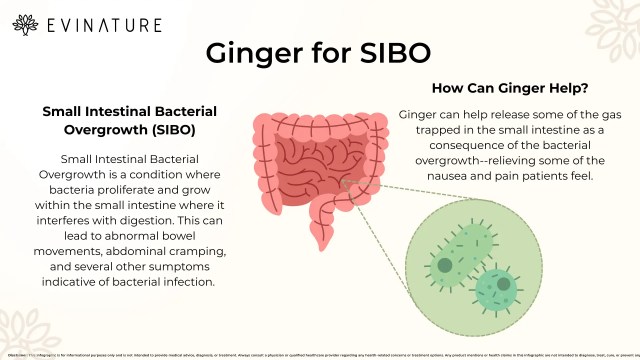Small intestinal bacterial overgrowth (SIBO) is a condition characterized by an increased bacterial load colonizing the small intestine. The small intestine is the location of most of the breakdown and absorption that takes place during digestion, and relies on specific environmental conditions to do so. When a disturbance, even one as small as bacteria, clocks in, this can cause significant digestive distress and nausea.

Ginger has been used for thousands of years as a digestive aid. It is used around the world in numerous forms — fresh, dried, powdered, candied, or brewed as tea — to improve gastrointestinal health in a manner that fits the lifestyle of the patient. In clinical research, it’s been studied for helping with nausea, speeding gastric emptying, and calming gas, amongst other functions.
While ginger shows modest antibacterial activity in lab studies, there’s currently no high-quality clinical evidence that ginger alone clears SIBO. Its best-supported roles are improving motility, easing gas and nausea, and reducing inflammation — which can make symptoms easier to manage alongside targeted SIBO treatments.
How Ginger May Support SIBO
Gut Motility
One of the main drivers of SIBO is slow small-bowel transit–food moves slowly through the small intestine, allowing for microbes to colonize the tissue. Ginger has been shown in clinical studies to speed gastric emptying and increase peristalsis. Better motility reduces the chance that bacteria will hang around and multiply in the small intestine.
Eases Trapped Gas and Bloating
Ginger is classically a carminative — it helps release trapped gas and relieve the pressure that often comes with SIBO. People commonly report less bloating and more comfort after ginger tea or food containing ginger.

Reduces Nausea and Upper-GI Discomfort
If your SIBO symptoms include nausea, reflux or indigestion, ginger is one of the most studied natural options for easing those sensations. It’s commonly recommended for nausea in a range of settings.
May Calm Inflammation
Ginger contains active compounds (gingerols, shogaols, etc.) that have anti-inflammatory and antioxidant actions in lab and animal studies. That can be useful when the gut is irritated during flare-ups or when bacteria die off and trigger temporary inflammation.
Mild antimicrobial activity (usually used alongside other therapies)
In lab studies, ginger extracts and essential oils show modest antibacterial activity against certain microbes. In clinical practice, ginger is more often used to support symptom relief and motility while targeted antimicrobials (pharmaceutical or herbal) do the heavy lifting against overgrowth.
When to take Ginger for SIBO
There’s no current recommendation for how not to take ginger, but there are definitive recommendations:
Between meals — if your main goal is motility support, giving your gut the support it needs, when it needs it (during digestion) can mark a great timestamp for taking ginger. This is also when the bacteria in the small intestine would be the most active; during exposure to nutrients–therefore, exposing them to ginger can reduce their replicative cycles and colonizational abilities.
With meals — if you want immediate relief from bloating, gas or post-meal discomfort.
Daily in food/tea — for gentle, ongoing digestive comfort and to make it part of a routine.
Dosage — how much and which form?
There’s no single “best” dose. However, there are a number of strategies patients have used to success:
- Start low (a slice of fresh ginger in hot water or a small amount of powdered ginger in food).
- Choose the form that fits your goal: fresh/tea for comfort, standardized capsules when you want a consistent dose.
- Increase slowly only if you tolerate it.
- Follow product labels and the advice of your healthcare practitioner for therapeutic (higher) doses. (For pregnant people, there is no universal “safe” upper limit; check with your clinician.)
Safety, side effects & interactions
Ginger is generally safe, however it is important to know the potential side effects:
- Common mild reactions: Some people notice nausea, abdominal cramping, looser stools, or — less commonly — constipation.
- Medication interactions: Ginger can affect blood clotting and blood sugar. If you take blood thinners (like warfarin), antiplatelet drugs, or diabetes medications, check with your prescriber before starting supplements. There are case reports and interaction notes in the clinical literature.
- Pregnancy & breastfeeding: Ginger is commonly used for nausea in pregnancy, but people who are pregnant or breastfeeding should talk with their clinician about dose and safety. Some regulatory reviews recommend caution at higher doses.
- Children: Use only under pediatric guidance.
Stop & call your doctor if: you develop severe abdominal pain, persistent vomiting, jaundice (yellowing of skin/eyes), unexpected bleeding/bruising, or other concerning symptoms.






